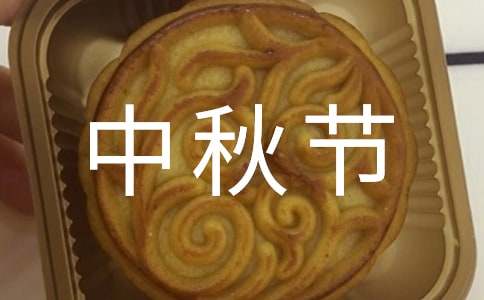- 相关推荐
中秋节的由来英语
中秋节始于唐朝初年,盛行于宋朝,至明清时,已成为与春节齐名的中国传统节日之一,是流行于中国众多民族与汉字文化圈诸国的传统文化节日,下面是小编为您带来的是中秋节的由来英语相关内容,希望对您有所帮助。

The phrase "Mid Autumn Festival" was first seen in Zhou li. In the early Tang Dynasty, the mid autumn festival became a fixed festival. "New Tang Chi fifth music volume fifteen five" load "in spring and autumn Shidian in Wenxuan Wang, Wu King", and "Kaiyuan nineteen years, beginning the Tai Gong temple is father, to leave Zhang Liang with. In the Spring Festival and Mid Autumn Festival, the ceremony of offering sacrifices to animals and music is like writing". The popularity of the mid autumn festival began in the Song Dynasty, and it became famous in the Ming and Qing Dynasties. It became one of the major festivals in china. Every year on the 15th day of the eighth month of the Chinese lunar calendar, is the traditional mid autumn festival. This is the mid autumn of the year, so it is called mid autumn festival.
In the Chinese lunar calendar, a year is divided into four seasons, each season is divided into three parts Meng, and the Mid Autumn Festival is also known as the mid autumn season. Fifteen the moon of August than in other months more round full moon, the more bright, so they are called "Yuexi", "August festival". This night, people look up to the sky, such as jade like the bright moon, naturally will look forward to family reunion. Far away from home, but also to rely on their hometown and loved ones missing. Therefore, the Mid Autumn Festival is also called "reunion festival"".
In order to inherit the national culture and strengthen the national cohesion, the Mid Autumn Festival has been listed as the national legal holiday by the State Council since 2008. The state attaches great importance to the protection of intangible cultural heritage. In May 20, 2006, the festival was included in the first batch of national intangible cultural heritage sites approved by the state council.
In ancient times, the Chinese people had the custom of "autumn, evening, evening and month". On the eve of the worship of god. To Zhou Dai, every mid autumn night will be held cold and sacrifice month. Large incense table, put the moon cake, watermelon, apples, red dates, plums, grapes and other offerings, cakes and watermelon is definitely not small. Watermelon is cut into lotus shape. In the moonlight, the gods on the moon, red candle high fuel, the whole family in order to worship the moon, then headed housewife moon cake. The cutting man will count in advance how many people there are in the family, and those who are at home and out of town must be counted together.
From ancient Qi salt, pious worship during childhood, grow up, with superior character into the palace, but was not patronize. In August fifteen the moon, the son of heaven to see her in the moonlight, feeling that her beauty is outstanding, after she was queen, mid autumn worship to. Change mid beauty, so willing to worship the girl, "looks like moon, as the moon".
In the Tang Dynasty, the Mid-Autumn Festival and the Moon Festival were quite popular. In the capital. Fifteen August night, a lot of people, both rich and poor, old and young, all must wear adult clothes, say desire for religious worship, pray that God bless the moon. The Southern Song Dynasty, folk to moon cake gift, take the meaning of reunion. In some places there are grass dragon dance, pagodas, etc.. Since the Ming and Qing Dynasties, the custom of Mid Autumn Festival is more prevalent; many places formed a burning incense, tree Mid Autumn Festival, point tower lights, lantern, walk the moon, dance and other special customs.
Today, the custom of playing on the moon is far from the old. But a banquet to celebrate the very popular, people ask the month to the wine, to celebrate the wonderfull life, or friends healthy and happy, and the family "partings". The Mid Autumn Festival has a lot of customs and forms, but all of them are full of love for life and yearning for a better life.
“中秋”一词,最早见于《周礼》。到唐朝初年,中秋节才成为固定的节日。《新唐书·卷十五 志第五·礼乐五》载“其中春、中秋释奠于文宣王、武成王”,及“开元十九年,始置太公尚父庙,以留侯张良配。中春、中秋上戊祭之,牲、乐之制如文”。中秋节的盛行始于宋朝,至明清时,已与元旦齐名,成为我国的主要节日之一。每年农历八月十五日,是传统的中秋佳节。这时是一年秋季的中期,所以被称为中秋。
在中国的农历里,一年分为四季,每季又分为孟、仲、季三个部分,因而中秋也称仲秋。八月十五的月亮比其他几个月的满月更圆,更明亮,所以又叫做“月夕”,“八月节”。此夜,人们仰望天空如玉如盘的朗朗明月,自然会期盼家人团聚。远在他乡的游子,也借此寄托自己对故乡和亲人的思念之情。所以,中秋又称“团圆节”。
为传承民族文化,增强民族凝聚力,中秋节从2008年起被国务院列为国家法定节假日。国家非常重视非物质文化遗产的保护,2006年5月20日,该节日经国务院批准列入第一批国家级非物质文化遗产名录。
我国人民在古代就有“秋暮夕月”的习俗。夕月,即祭拜月神。到了周代,每逢中秋夜都要举行迎寒和祭月。设大香案,摆上月饼、西瓜、苹果、红枣、李子、葡萄等祭品,其中月饼和西瓜是绝对不能少的。西瓜还要切成莲花状。在月下,将月亮神像放在月亮的那个方向,红烛高燃,全家人依次拜祭月亮,然后由当家主妇切开团圆月饼。切的人预先算好全家共有多少人,在家的,在外地的,都要算在一起,不能切多也不能切少,大小要一样。
相传古代齐国丑女无盐,幼年时曾虔诚拜月,长大后,以超群品德入宫,但未被宠幸。某年八月十五赏月,天子在月光下见到她,觉得她美丽出众,后立她为皇后,中秋拜月由此而来。月中嫦娥,以美貌著称,故少女拜月,愿“貌似嫦娥,面如皓月”。
在唐代,中秋赏月、玩月颇为盛行。在北宋京师。八月十五夜,满城人家,不论贫富老小,都要穿上成人的衣服,焚香拜月说出心愿,祈求月亮神的保佑。南宋,民间以月饼相赠,取团圆之义。有些地方还有舞草龙,砌宝塔等活动。明清以来,中秋节的风俗更加盛行;许多地方形成了烧斗香、树中秋、点塔灯、放天灯、走月亮、舞火龙等特殊风俗。
今天,月下游玩的习俗,已远没有旧时盛行。但设宴赏月仍很盛行,人们把酒问月,庆贺美好的生活,或祝远方的亲人健康快乐,和家人“千里共婵娟”。中秋节的习俗很多,形式也各不相同,但都寄托着人们对生活无限的热爱和对美好生活的向往。
[中秋节的由来英语]相关文章:
1.关于中秋节的由来英语版
2.中秋节的由来英语(双语版)
3.中秋节的由来与传说
4.了解中秋节的由来
5.中秋节的由来及传说
6.关于中秋节的由来
7.8月15中秋节的由来
8.中秋节风俗的由来
9.中秋节的由来和风俗
10.中秋节的由来介绍
【中秋节的由来英语】相关文章:
中秋节由来06-07
中秋节名字的由来08-27
中秋节由来与传说07-18
中秋节的由来及简介09-19
中秋节的由来介绍09-28
中秋节的来历与由来08-12
关于中秋节赏月的由来10-08
中秋节的简介及由来传说05-27
中秋节由来和习俗08-28
中秋节吃月饼的由来03-12